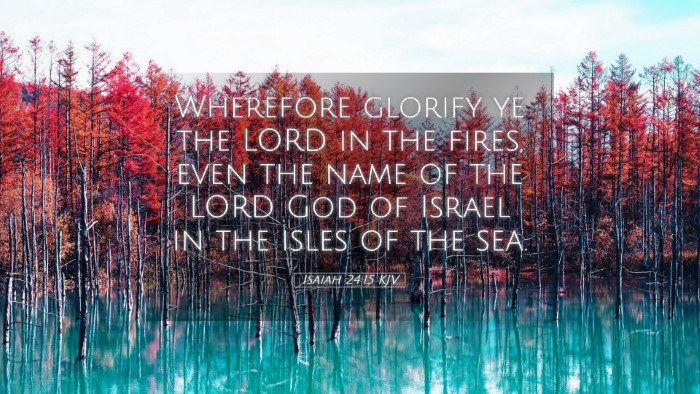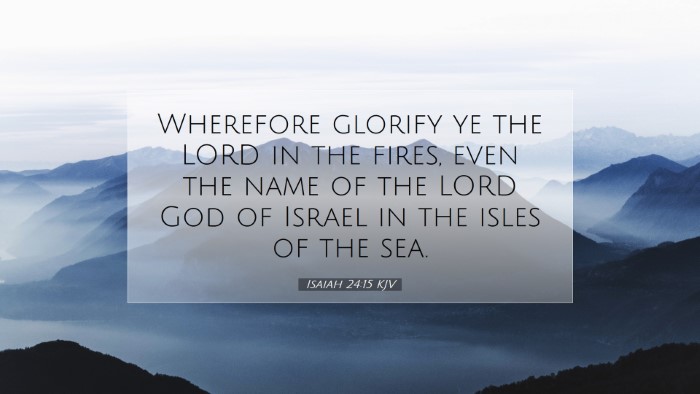Commentary on Isaiah 24:15
Verse: "Wherefore glorify ye the Lord in the fires, even the name of the Lord God of Israel in the isles of the sea."
Introduction
The prophecy in Isaiah 24 articulates a vision of cosmic judgment and the restoration of God’s glory amidst desolation. In verse 15, we see a call to glorify the Lord despite the surrounding calamity. The phrase "in the fires" signifies challenges and trials that serve to refine and reveal the essence of faith, urging believers to proclaim the Lord's mighty deeds.
Contextual Analysis
Isaiah 24 addresses the devastation that will befall the earth due to sin and rebellion against God. As such, the chapter can be divided into various themes:
- Divine Judgment: The initial verses describe a collapse of societal structures, indicating a divine response to human iniquities.
- Universal Condition: The ruin is not localized; rather, it affects all nations, suggesting God’s sovereignty over all creation.
- Hope Amid Despair: Even in this dark prophecy, there is a call to glorify God, highlighting that the faithful have a purpose even in judgment.
Insights from Matthew Henry
Matthew Henry emphasizes the importance of glorifying God in times of affliction. He posits that trials refine believers, much like fire purifies precious metals. This metaphor aligns with the scriptural narrative that suffering is not without purpose. The verse serves as a reminder that even in the midst of fire—symbolizing trials and tribulation—worship remains a vital response to God’s sovereignty.
He further explains that "the isles of the sea" refer to distant lands, signifying that God’s majesty is to be proclaimed universally. This call extends beyond geographical boundaries, indicating the global nature of God’s glory and the universal mission of the church.
Insights from Albert Barnes
Albert Barnes interprets the phrase "in the fires" as an encouragement for believers to maintain their faith during trials. He notes that declaring God's glory amidst difficulty is a powerful testimony of faith that can encourage others. Barnes draws attention to the idea that those who are faithful are called to serve as witnesses to God's providence and grace.
Barnes also suggests that the reference to "the isles of the sea" illustrates the extent of God’s recognition and glory. It points to the response of the Gentiles who, even in dire circumstances, are called to honor and worship the Lord. The verse, therefore, forms part of a larger narrative that emphasizes God’s universal dominion.
Insights from Adam Clarke
Adam Clarke adds depth by highlighting that the "fires" represent divine judgments that should lead to repentance. He states that glorifying God is an act that should arise not only from reverence but also as an acknowledgment of His power to save from judgment. Clarke suggests that those confronted with suffering should recognize these moments as opportunities to draw closer to God and to proclaim His love and mercy.
Clarke correlates the call to glorify God with the notion of an eternal purpose that transcends temporal suffering. He concludes that the admonition is not merely for the Israelites but anticipates a time when all nations—even those at the ends of the earth—will praise the Lord, spotlighting the inclusivity of God’s redemptive plan.
Theological Implications
This verse encapsulates essential theological themes, specifically the relationship between suffering and worship. It suggests that God uses circumstances, even distressing ones, to draw His people closer to Him. Some key implications include:
- God’s Sovereignty: Acknowledging that God reigns over all creation, despite appearances.
- The Purpose of Suffering: Understanding that trials can serve as catalysts for deeper faith and dependence on God.
- Universal Worship: Affirming that worship should be proclaimed from every corner of the earth, emphasizing the Great Commission.
Practical Applications for Today
This verse offers several applications for pastoral ministry, theological education, and personal devotion:
- Encouragement in Trials: Pastors should remind congregants that glorying in God during hardships is an act of defiance against despair.
- Worship as Witness: Students and scholars should explore how worshiping God serves as a powerful testimony in a world rife with suffering.
- Global Perspective: A commitment to missions and outreach that highlights the need to glorify God among all nations.
Conclusion
Isaiah 24:15 stands as a profound declaration of faith amidst turmoil. The call to glorify the Lord in challenging circumstances underscores the Christian's response to God's sovereignty and grace. As we reflect on this verse, may we commit to living lives that honor God, recognizing that even in the fires, we are summoned to proclaim His glory across the globe.


